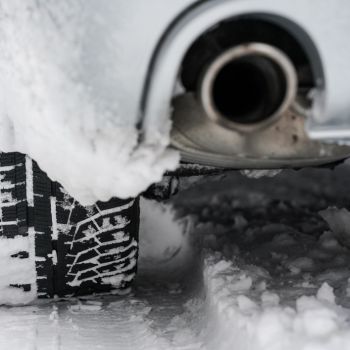 Your car's exhaust system plays a crucial role in both performance and safety. It channels harmful gases away from the engine and helps reduce emissions, making it essential for proper operation and environmental compliance. However, during winter, this vital system is often at risk due to harsh conditions that can lead to costly damage if not addressed early.
Your car's exhaust system plays a crucial role in both performance and safety. It channels harmful gases away from the engine and helps reduce emissions, making it essential for proper operation and environmental compliance. However, during winter, this vital system is often at risk due to harsh conditions that can lead to costly damage if not addressed early.
Being located close to the ground, your exhaust system is especially vulnerable to the elements. Winter weather—such as ice, snow, and road salt—can cause serious issues that affect not only the system’s functionality but also your safety. Understanding how these common hazards impact your vehicle can help you avoid expensive repairs and keep your car running smoothly all season long.
Impact of Road Debris
After heavy rain or melting snow, roads can develop potholes and become littered with sharp debris. These obstacles can hit your exhaust system directly, causing dents, cracks, or even loosening components. Over time, this damage can lead to leaks, reduced performance, and increased noise levels.
Salt and Snow: A Dangerous Combination
When snow and ice cover the road, they create a moist environment that can seep into your car’s undercarriage. Adding rock salt to the mix makes things worse, as it accelerates rust and corrosion. This combination can weaken critical parts of your exhaust system, such as the muffler and pipes, leading to potential failure.
Here are some consequences you might face:
- Moisture builds up inside the exhaust system, especially in the muffler.
- Exposure to salt speeds up the rusting process, weakening metal components.
- Rust can cause leaks, allowing dangerous carbon monoxide to enter the cabin.
To prevent this, it's important to wash your car after a storm, especially the undercarriage, to remove any built-up salt and moisture.
Clearing Snow and Ice Safely
If your car gets stuck in a snowbank or you're digging it out after a heavy snowfall, be careful—snow and ice can block your exhaust pipe. If left unchecked, this can cause exhaust gases to back up and enter your vehicle, posing a serious health risk.
Before driving, make sure to:
- Check the tailpipe for snow or ice buildup.
- Keep windows open, even if the tailpipe is clear, as snow walls may push exhaust fumes back toward the car.
- Run the engine periodically while digging, rather than leaving it running constantly.
Short Drives and Moisture Buildup
Driving your car for short distances—under 20 minutes—can prevent the exhaust system from warming up enough to evaporate moisture. This leads to condensation building up inside the system, which can freeze and cause rust, cracks, or damaged gaskets over time.
Signs That Your Exhaust System Is Damaged
It's important to recognize the warning signs of an issue with your exhaust system. These include:
- Unusual noises like roaring, rattling, or vibration while driving.
- A hissing sound coming from the exhaust area.
- Increased fuel consumption without a clear reason.
- Sluggish acceleration or hesitation when pressing the gas.
- A strong smell of exhaust around your car.
- Dark gray or blue smoke coming from the tailpipe.
If you notice any of these symptoms, don't ignore them. Exhaust system problems won’t fix themselves, and delaying repairs can lead to more severe issues down the line. Contact DaSilva’s Auto Body today for a thorough inspection and necessary repairs. Protect your vehicle and your family’s safety—schedule an appointment now!
Huai'an Senyu Intelligent Technology Co., LTD , https://www.jshasyzn.com